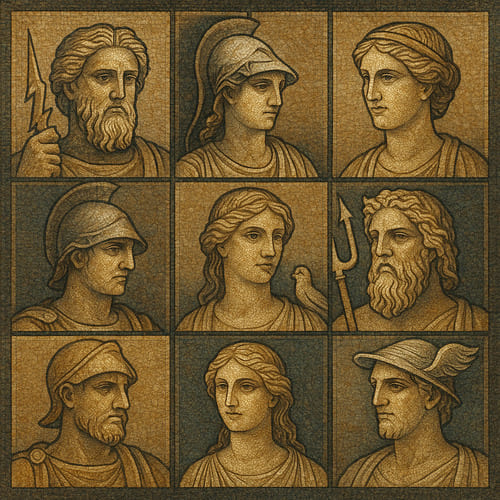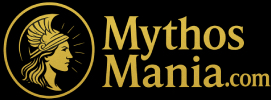Greek Mythology: Gods, Heroes, Myths, and Creatures of the Hellenic World
Greek mythology is one of the richest and most fascinating traditions in history. It is filled with powerful gods, brave heroes, amazing creatures, and stories that have deeply marked Western culture.
In this complete guide, we invite you to enter the mythical world of Ancient Greece, meet its protagonists, explore its most famous legends, and understand why they remain so present today.
What is Greek mythology?
Greek mythology is the collection of myths, beliefs, and stories that the ancient Greeks used to explain the origin of the world, natural phenomena, human behavior, and the values of their society.
These stories were transmitted orally for centuries and were later collected in texts such as those by Homer or Hesiod, leaving a legacy that has influenced Western literature, art, and thought.
The gods of Olympus
The Olympian gods lived at the top of Mount Olympus and ruled the world from there.

Each had their own domains and attributes. Some of the best known are:
- Zeus: king of the gods, lord of the sky and lightning.
- Hera: goddess of marriage and family.
- Athena: goddess of wisdom and strategy.
- Apollo: god of the sun, music, and prophecy.
- Artemis: goddess of the hunt and forests.
- Ares: god of war.
- Aphrodite: goddess of love and beauty.
- Poseidon: god of the sea and earthquakes.
- Hades: god of the underworld.
- Hermes: messenger of the gods, protector of travelers and merchants.
- Hestia: goddess of the hearth and sacred fire.
- Dionysus: god of wine, madness, and theater.
Each of them has a personality, symbols, and myths that define them.
The Titans and the origins of the cosmos
Before the reign of the Olympian gods, the world was dominated by the Titans, a powerful race of primordial deities, children of Gaia (the Earth) and Uranus (the Sky). They embodied the fundamental forces of the universe and were the first great protagonists of Greek myths.
The most prominent was Cronus, who overthrew his father Uranus with a sickle and became lord of the cosmos. However, fearing being dethroned by one of his children, he devoured them at birth. This led his wife Rhea to hide her youngest son, Zeus, who years later rebelled against him and unleashed a titanic war: the Titanomachy.
In this war, Zeus and the Olympian gods fought against the Titans and finally defeated them, sealing their reign on Mount Olympus.
Among the defeated Titans was Atlas, brother of Cronus, who was punished by Zeus with a unique sentence: to hold the celestial vault on his shoulders for eternity. This image has become one of the most iconic symbols of Greek mythology, reflecting the weight of divine punishment and superhuman strength.

Unforgettable heroes and demigods
The heroes of Greek mythology were mortals with extraordinary abilities or divine ancestry. Their deeds made them legendary, although often their stories end in tragedy:
- Heracles (Hercules): famous for the twelve labors.
- Perseus: killed the fearsome Medusa.
- Theseus: defeated the minotaur in the labyrinth of Crete.
- Achilles: protagonist of The Iliad and hero of the Trojan War.
- Jason: leader of the Argonauts in search of the golden fleece.
- Atalanta: swift and brave heroine, symbol of female independence.
Mythological creatures
The Greek imagination is full of monsters and fantastic beings, which embody fears, challenges, and mysteries:
Each creature has a unique story that you can discover in their individual profiles.
Most famous myths and legends
Greek myths have served for centuries as a source of teachings and entertainment. Some of the best known are:
- The judgment of Paris
- The theft of fire by Prometheus
- Orpheus and Eurydice
- The odyssey of Ulysses
- The myth of Oedipus
Mythical places of Greek mythology
Many mythical settings were real or symbolic. These places are an essential part of the stories:
- Mount Olympus: home of the gods.
- The Underworld: realm of the dead, ruled by Hades.
- Delphi: sacred center and seat of Apollo's oracle.
- Troy: scene of the famous war.
- Crete and the Labyrinth: where the minotaur lived.
Universal themes of Greek mythology
Greek myths deal with fundamental questions of human existence, which makes them timeless:
- Destiny and inevitability
- Pride (hybris) and its punishment
- Love, jealousy, and betrayal
- The search for glory or redemption
- The duality between human and divine
Cultural footprint of Greek mythology
From antiquity to the present day, Greek mythology has influenced all the arts:
- Literature, theater, and poetry
- Painting, sculpture, and architecture
- Film and series (Troy, Percy Jackson, 300)
- Video games (God of War, Hades)
- Philosophy and psychology (such as Freudian complexes)
Resources to delve deeper
- Family tree of the gods → see here
- Chronology of myths → see here
- Recommended books on Greek mythology → see here
- Games and trivia → see here
Ready to discover the world of Greek gods and heroes?
Explore every corner of Olympus at MythosMania.
